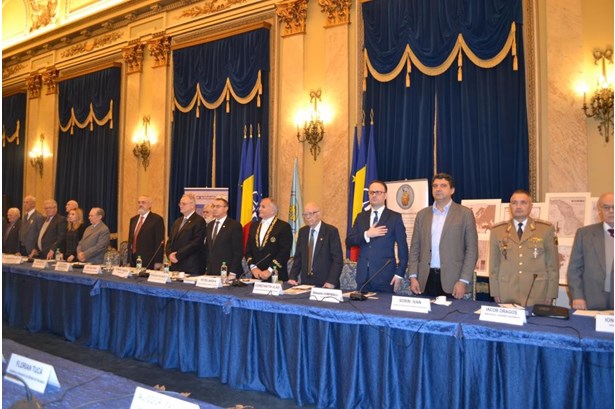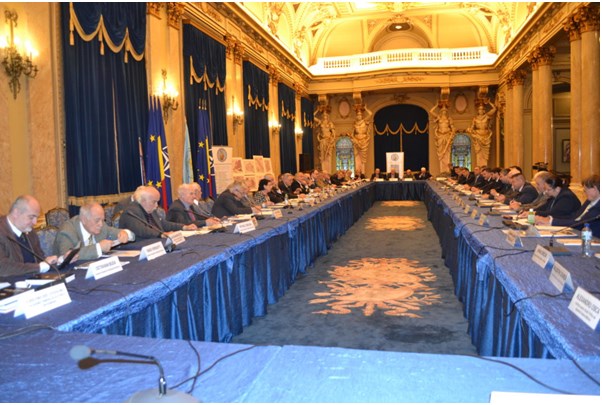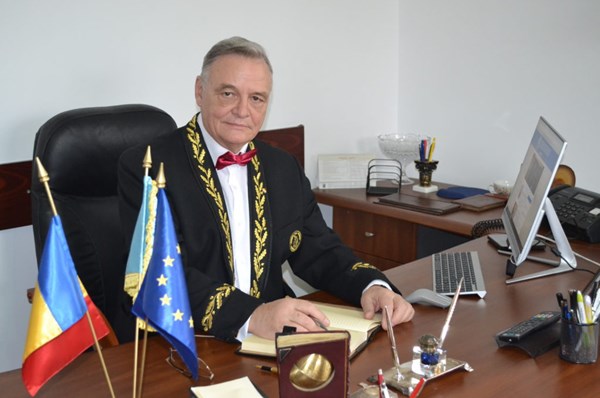Interview with prof. univ. dr. eng. Adrian Badea, President of the Academy of Romanian Scientists
Posted by Prof. univ. dr. Sorin Ivan | Dec. 19, 2018 | Dialogues |
President Adrian Badea, one of the institutions intensely concerned with the celebration of the Centenary of the Great Union and the significance of this great celebration of all Romanians is the Academy of Romanian Scientists. This is evident from the events you have organised so far, which we know will be followed by others before the end of the year. How do you explain this concern of the AOSR to celebrate the Centenary on such a scale and complexity?
Adrian Badea: In general, I avoid using big words, considering that important things require a certain stylistic sobriety. In this case, there is only one answer, and I say it openly: we have been driven to approach the Centenary, as we have done throughout this special year, by a sense of duty. The duty we owe and feel towards our history and our country, towards the generations of young people who have the right to know their past and their identity, who have the right to aspire and to have a good future. And also a duty to our own conscience. For me, celebrating the great events of national history is a duty of conscience. I would like to make a nuance within the term “celebrate”. Of course, celebration implies joy, gestures, a certain festive, celebratory air, which all have their role and purpose. Let us not forget that the academic anthem, with long traditions in medieval university Europe, urges us to rejoice, Gaudeamus igitur. But that’s not all. In my view, celebration does not mean festivity, it should not be just a formal, meaningless event, dressed up in gala clothes. By celebration I see a deep and complex understanding of the historical event in question, a way of trying to highlight its exemplary meanings and meanings, of learning from the lesson it offers us, of honouring it and cherishing it in its substance. This is my conviction and that of my colleagues in the Academy of Romanian Scientists, whose members include prestigious historians. This is the vision that underpins the series of events dedicated to the Great Union, brought together in the Centenary Programme.
Please refer to the Centenary Programme. What does it include and what have you achieved from what you set out to do?
Adrian Badea: It is a complex programme of national and international scope, structured in two main sections: Scientific Events, Debates, International Conferences and Publishing of books, proceedings volumes, digital works. It began on January 8, 2018 with a lecture by Ambassador Constantin Vlad, “The 14 Points of American President Woodrow Wilson, an iconic document for the 20th century. Impact in our time and significance in our contemporaneity”, and continued with symposia dedicated to Eminescu, seen not only as the National Poet, but also as the precursor of the Great Union, in the country and abroad, national and regional debates, AOSR spring and autumn conferences, traditional events of our institution, with very good results in terms of scientific research. In this context, I would highlight the debate “The Union of Bessarabia with Romania – an act of historical justice, a fundamental step towards the achievement of the Great Union”, which took place at the end of March at the Palace of Parliament, a real history lesson. Another debate in the same programme, on the theme “School, Church, Army – institutions with a fundamental role in the achievement of the Great Union”, took place recently, in November, in the Marble Hall of the National Military Circle. Also in the field of events, we initiated a very special project, “Dialogue of Generations – Meetings with High School Students”, under the aegis of which we held a meeting with the students of Ion Creanga National High School in Bucharest on the theme “Knowledge of national history, the way to understand the present and build the future”. With regard to the other component of the Centenary Programme, under the aegis of the AOSR, books written by historians, established authors, dedicated to the Great Union and the entire historical framework of the era, including the First World War, the Paris Peace Conference, the Treaty of Trianon, developments following the recognition of the Great Union, etc., have appeared and continue to appear. In addition, there are a number of reprints of works of special historical importance, also produced under the aegis of the Centenary. I would highlight here the editorial project “One hundred years in one hundred books”, coordinated by Prof. Ioan Scurtu, PhD, the work One Hundred Years of Romanian Diplomacy, written by ambassadors and university professors Constantin Vlad and Ion M. Anghel and, last but not least, a very interesting project of undeniable usefulness, the digital platform “Virtual Dictionary of the Great Union”, under the coordination of Prof. Doina Banciu.
Recently, as you mentioned, you organised a debate at the National Military Circle, dedicated to the role of the Church, the Army and the School in the achievement of the Great Union. What was discussed and what conclusions were drawn from the event?
Adrian Badea: The debate “School, Church, Army – institutions with a fundamental role in the achievement of the Great Union” was a large-scale event, which brought together historians, soldiers, clergy representatives, teachers, personalities of Romanian culture and public life. The lectures at the event focused on the role of each of these institutions in our history, in the process of the establishment of Modern Romania, during the First World War and in the achievement of the Great Union. There were substantial interventions, particularly interesting both in terms of information, some of them unpublished, and in terms of perspective and interpretation of the facts of history. Of course it is not the place here to go into the details of the event, but it is important to underline that the diversity of the ideas expressed can be subsumed into a general conclusion, namely that the School, the Church and the Army played a major role in the history of Modern Romania and in the achievement of the Great Union. The school brought the Romanian people to the light of knowledge and awakened national consciousness in the souls and minds of Romanians in all Romanian provinces. The School also gave blood sacrifice in wars and especially in the First World War through teachers and professors who sacrificed themselves for the country and for the ideal of Unification. The Church was the permanent support and refuge of the people, educated and enlightened the peasants, instilled faith and hope in them, strengthened their souls and accompanied them everywhere, including on the front of the War of Independence and the great war that led to the achievement of the national ideal of the Great Union. The Romanian Army has always served the country with heroism and sacrifice, has put the homeland above everything and, through its soldiers, through the sacrifice of millions of heroes and martyrs, mostly peasants, led the country to victory. The Romanian Army played a crucial role in the achievement of the Great Union and, further on, in its subsequent defence, after the end of the First War, during the negotiations and treaties. I would summarize by saying that the three institutions, the Church, the School and the Army, are the pillars of our nation, of Romanian civilization.
We are fast approaching the apotheosis of the Centenary, 1 December 2018, a century since the Great Union. What should, in your view. and the institution you lead, the Academy of Romanian Scientists, to understand from this celebration? What are the deeper meanings of the historical event for our world today and how should we live them as a nation?

As I said earlier, we must not limit ourselves to mere celebration. We need to extract the fundamental meanings from the events we celebrate and learn from them. It is a way of reactualising the past in the consciousness of the present, of assuming history with its great moments, with its founding events. The First World War and the Great Union convey an essential message: when they had a great project, a national project, the Romanians knew how to act to achieve it. The Great Union and its result, Greater Romania, is the most important project in the history of Romanians. A grandiose project, accomplished with dignity, awareness of the assumed identity, love of country, spirit of sacrifice and sacrifice. The series of events in the second decade of the last century must be seen in the light of the great objective of liberating the Romanians from the yoke of the temporary empires and uniting them into a single country. This is why Romania entered the war, why our soldiers fought and gave their blood for the fulfilment of this historical dream, the magnificent ideal of union. It is true that they had wise leaders, patriotic politicians, among whom the figure of Ionel Brătianu shines and will always shine in the sky of our history, great generals such as Constantin Prezan, priests, intellectuals, the elite of Romanian society at that time. This elite achieved the fundamental metamorphosis of a dream into a national project of immediate order: the Great Union. Well, from here we must learn and know that we have had great moments in our history, not only in the distant, but in the modern and contemporary history, when, through intelligence, courage, dignity and a high patriotic consciousness, we have achieved what seemed impossible. Because, since Michael the Brave, the union of all Romanians in one country has remained a utopia. The lesson of history is simple: when the Romanian people set their mind to something, they succeed in fulfilling their dream. But to do this, they must have a proposal, identify a fundamental project, have visionary and patriotic leaders, and act in full synergy and unity towards achieving the goal. The knowledge of history, of these moments of great national achievement is a moral support for today’s people, to support and motivate them in the process of building the future, the Romania of tomorrow. Returning to this important act of our history, I believe that we honour the Centenary of the Great Union and our historical past by what we are doing today for the future of Romania, for our national identity and the values of Romanian civilisation.
You talk about duty, conscience, national identity, dignity, national ideal. Are these concepts current in the Romanian world? What place do they occupy in Romania’s consciousness today?
Adrian Badea: I like to think that they exist, somewhere, in the deep consciousness of Romanians. It is true that our current world is not the ideal framework for their awareness, assumption and manifestation. We are, unfortunately, divided, we are a divided society, dominated by different, sometimes contradictory, interests and tendencies, a world in which discord sometimes becomes more prominent than concord and harmony. Such a reality cannot be the breeding ground for the concepts I was talking about. It is rather a barren land, from which nothing good grows, but only poisoned fruit, quarrels, conflicts, rivalries and a permanent state of tension, which does no one any good. But I would like to believe that we have, as individuals and as a nation, the reason, the intelligence and the resources to bring these fundamental notions to light and, in their light, to shape a sense of evolution, with the magnificent model of history, the Great Union, as a guiding star, and, based on this model, a cardinal point of our becoming, fixed in the not too distant future.
It’s a process that now, from the world and atmosphere we live in, seems extraordinarily difficult. Is it utopian? Can we achieve it? How can we do this?
Adrian Badea: I and others who think like me, gathered in our institution, believe that the main means by which we can recover notions such as conscience, dignity, national identity and others like them is education. Our main mission as intellectuals, as teachers, is to educate young people, from an early age, in the spirit of knowledge of our history, of our great historical figures and events, of our identity values, of our ideals over time, which, through intelligence, diplomacy, struggle and sacrifice, we have also fulfilled. The Great Union is the apotheosis, the great lesson of our history, which must be taught to young people and learned by them. Young people must be taught the lesson of Romanian culture and civilization, through which they learn that we have given the world universal values in all fields of science, technique and technology, literature and art. They need to learn and know things of substance about Eminescu, Blaga, Mircea Eliade, Cioran, Eugen Ionescu, Brâncuși, Enescu, about Petrache Poenaru, Anghel Saligny, Aurel Vlaicu, Vuia, Coandă, Nicolae Paulescu, Vasilescu-Karpen, Gogu Constantinescu, Hermann Oberth, Ana Aslan, and so many others, a plethora of universal values. He should know that in Romania, not far from the centre of the capital, there is the most powerful laser in the world, the ELI project, which will reach its potential next spring, a world technological peak. These are topics and names that are not really on the agenda of today’s schools, let alone the media, which is dominated by other topics. If we tell young people all these things, if we guide them in the universe of this knowledge related to Romanian science, culture and civilization, they will understand that they are part of a nation that has given something to the world, that has made an important contribution to the development of universal civilization. Education, the knowledge of our fundamental, founding values, is the way to form national consciousness and identity. In this process, young people must be our top priority. This is the vision we promote, we share and on the basis of which we act as an institution, the Academy of Romanian Scientists. This is why we have also initiated the project “Dialogue of Generations – Meetings with High School Students”, which adds to our constant concerns in this regard.

The Centenary year awaits its apotheosis on the first day of December 2018. After that, inevitably, it will end. What do we do, as a society and a nation, after the Centenary? Will we think of 2018 as a fond memory or will we continue in the same spirit that defined it?
Adrian Badea: I like to think that 2018 means more than a celebration. I hope it will be the beginning of a moral and spiritual resurrection of our nation. The Centenary year has reactualised events, historical figures and meanings in a necessary act of awareness and assumption in a festive setting. I want us not to stop here, but to continue thinking and acting in the same spirit. I am talking about recovering our self-consciousness as a nation, as a people who have played an important role in history and who still have a mission to fulfil. I am thinking of affirming more strongly our identity in the concert of European diversity and, not least, our national dignity. We have everything we need as a nation to succeed in history: we have exceptional personalities and achievements, we have an important culture, we have an ancient, solid civilisation, European by definition. We have universal values, recognised, at least some of them, as such. We have very intelligent young people, and not from yesterday and today, who win gold medals and first places on international podiums in mathematics, computer science, science, knowledge, who emerge victorious in competition with competitors from China, USA, Russia, India, Japan, etc. We have a great potential for intelligence, which we must harness.
So what are we missing to be what we could be – a prosperous, strong and respected nation in the European Union and the world?
Adrian Badea: We lack a stronger involvement of genuine elites from all fields in the work of rebuilding Romania in today’s world. We lack a vision that integrates all projects and resources into a country project or several fundamental country projects, in the medium and long term. We lack the cohesion to achieve these great projects, currently extremely divided. We need good people in all fields, we need educated, wise and visionary politicians. We also need more dignity, more patriotism and more love of country. When we have all these things, and I am confident that we will have them not very far in the future, then Romania will have a very serious chance of realising its potential and becoming what we want it to be, what it can and deserves to become. I am optimistic and I will tell you why: young people are coming from behind, young people of value, educated at Romanian universities and at great universities abroad, they come with a different mentality. They are the elite who will change Romania for the better, as we want. In this process, all of us, the entire Romanian nation, can and must play a role.
Interview taken from “Clipa” Magazine, December 2018


